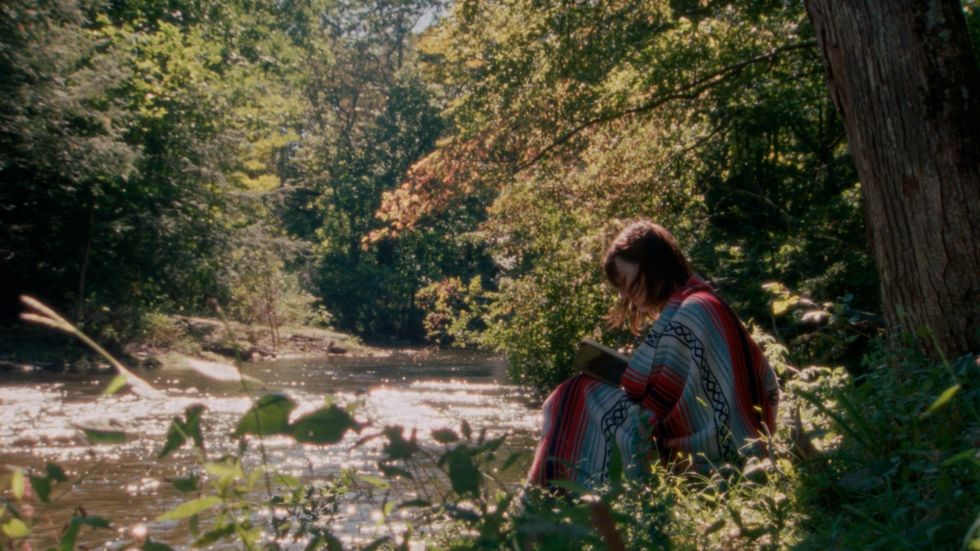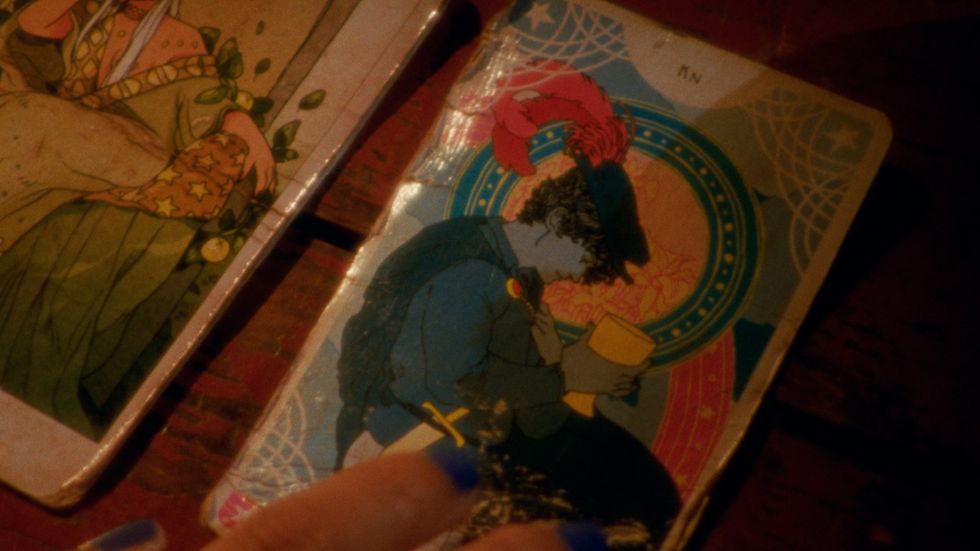
Directing your first feature film is just about as daunting as an experience can be. Getting a grasp on department dynamics, wrestling with artistic versus practical decisions, getting the right amount of sleep when you need it. It’s not easy anyway you frame it, and that’s why firsthand accounts from thoughtful talented directors is invaluable.
Phoebe Nir’s first feature Eco Village puts an artistic framework around the traditional coming of age story, finding humanity in an innocent exploration of community and romance. Shot on celluloid and adapted from a stage play, Eco Village is a lovely exploration of finding the confidence to grow into the person you want to be.
Below, Phoebe further explores her experience writing and directing her Rotterdam Film Festival selected film, touching on finding the story as you go, crafting a diegetic soundtrack, and how prioritizing mental health is an invaluable skill as a filmmaker. Enjoy!
The following quotes from Phoebe Nir are edited for clarity and readability.
Phoebe’s Insightful Takeaways as a First-Time Director

“The first thing that’s coming to mind is leadership style.
I’m kind of a nerd—I’m a writer first and foremost—but you have to step up and be in command. You have to run set.
That felt uncomfortable for me in the beginning of the process, but I think by the end of it I got [thicker] skin. No one prospers if I’m wishy washy or mushy, and no one’s going to love me if I’m softening everything, but then it’s not clear. So I think just having to step into that sort of director executive role was a big learning experience for me.
I think there’s a real truism to this idea [that] you find the movie once in writing it, and then once on set, and then once in editing.
But I feel like there’s a fourth thing, which is the phase that I’m at now, which is entering the marketplace and entering the world and finding the audience, and that’s its own cycle of birth and death and trial and error and an adventure in and of itself, and the one that is the one that determines the most, who sees your project and if it gets out there. So that’s kind of the journey that we’re on right now.
[I was think I was stunned] by just showing up with my script, thinking I knew what the piece was, and then finding myself wrong again and again and again, and having to just make really drastic changes and pivoting and to conform to the energy.
That other creative collaborators are bringing ideas. It really just changed so much more than I expected to in every phase, including this current post-post-production phase.”
How to Incorporate a Completely Original, Diegetic Soundtrack

“Harold and Maude is one of my favorite movies, and so the way that the Cat Stevens soundtrack is mostly in the distance and mostly the characters don’t seem aware of it, but then when Maude is like, if you want to sing out, it blew my mind, that subtlety. I love that little moment. And so that was a big influence.
Also, the original The Wicker Man from the seventies [uses] diegetic music really creatively. And in Chicago where she has these dissociative fantasies where it’s like she’ll see something in real life, and then in her mind—she’s in this cabaret world.
I think Robin sort of has a tendency to dissociate in that way. So that was a lot of fun.
It was really fun to make the songs, and it was a really fun creative challenge to be like, okay, we have no rehearsal time, how do I make these songs? How do we stage them so that each actor and each character has a little musical moment in a way that doesn’t feel forced and feels organic? And they’re all kind of different and used different instruments to express their personality, or whatever.”
Need to Improvise a Dream Ballet? Here’s How

“The Dream Ballet was totally new to the movie.
In the play version, it was this kind of sort of implied rave orgy thing. We were running out of time and it was so buggy out, and one of the actors was on crutches, and one of them had been hospitalized with poison ivy, and it was just not going to happen. And so I was really just like, how do we figure this out in the shortest possible way?
That was probably my favorite thing. That just totally evolved organically out of constraints and time limits on set. And so I was like, what the fuck are we going to do? I’m like, we’re not going to have an orgy. So I was like, I had a friend who was a choreographer, and I think it was Friday, and I texted and he was supposed to come up to do another thing on Monday, and I was like, I need you to get two dancers, and we need to do a dream ballet that’s going to tell Robin and Jake’s love story.
So it just happened. We ran out of time and everyone was on medical leave, [and it] ended up being my favorite part of the whole movie.”
Reflections on Building an Indie Ensemble

“Our casting director, Lois Drabkin was amazing. She’s been such a supporter of the project, and she was the one who initially read the script and suggested Sidney Flanigan (Never Rarely Always Sometimes), which made the whole thing make sense.
That really was the starting place for the whole project. We reached out to Sydney, and she was on board and was excited about the musical elements because she’s a musician and her band Star Juice is really cool.
One of the most satisfying parts of watching the movie—and why I think it works, if it works, is it’s a weird ensemble cast. They all have such a diversity of backgrounds in terms of what they’re bringing.
Sydney is very naturalistic and almost method, and has these instincts and goes with it. Whereas Alex Breaux, who that plays Jake, the romantic interest, he was following a stage crew in New York for a long time, and he trained at Julliard, and so comes from a much more of that background.
And Lindsay Burge is an indie mumble core royalty queen and is bringing that. Devika [Bhise] is a dancer with these physical slapstick stuff, and Eric [Austin] does improv comedy. So it just feels like everybody is kind of very different, and so it’s lots of different flavors in the pot.”
In Conclusion, Here’s Some Invaluable Advice

“I guess I’ll just speak from my own experience, which is that stress management is everything. There’s nothing that anyone can teach you in terms of skill or even talent or genius. You can have all of those things, but if you can’t manage your stress and your emotions and work with other people in a format that’s as collaborative and as interpersonally demanding as film, you’re going to fail.
It’s like if you can maintain emotional balance and figure out healthy coping mechanisms to deal with the stress that’s going to be an inevitable part of a year’s long process, then that’s going to be the best thing that’s better than genius, that’s better than talent, and that’s better than film school.”
Author: Grant Vance
This article comes from No Film School and can be read on the original site.
